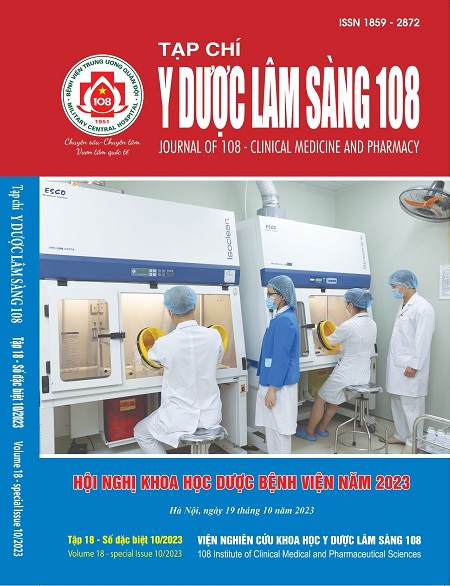Determination of drug-related problems in type 2 diabetes outpatient
Main Article Content
Keywords
Abstract
Objective: To identify drug-related problems in outpatients with type 2 diabetes treated at 108 Military Central Hospital. Subject and method: A descriptive, retrospective study based on data from electronic medical records of outpatients with type 2 diabetes from 01/5/2023 to 30/6/2023. Result: 854 DRPs in 620 patients were identified, of which DRPs related to antidiabetic drugs 63.6%, DRPs related to statin 31.2%, and antihypertensive drugs 5.2%. No DRP was detected in the prescription for antiplatelet drugs. Conclusion: Patients with type 2 diabetes with characteristics of long-term duration of treatment, many chronic comorbidities, and polypharmacy which potentiate a high risk of DRPs. It is necessary to implement clinical pharmacy interventions to reduce DRPs and therefore contribute to improve the quality of treatment in diabetes type 2 patients.
Article Details
References
2. Hughes JD, Wibowo Y, Sunderland B, Hoti K (2017) The role of the pharmacist in the management of type 2 diabetes: current insights and future directions. Integr Pharm Res Pract 6: 15-27.
3. Griese-Mammen N, Hersberger KE, Messerli M, Leikola S, Horvat N, van Mil JWF, Kos M (2018) PCNE definition of medication review: Reaching agreement. International Journal of Clinical Pharmacy 40(5): 1199-1208.
4. Arnett DK, Blumenthal RS, Albert MA, Buroker AB, Goldberger ZD, Hahn EJ, Himmelfarb CD, Khera A, Lloyd-Jones D, McEvoy JW, Michos ED, Miedema MD, Muñoz D, Smith SC Jr, Virani SS, Williams KA Sr, Yeboah J, Ziaeian B (2019) 2019 ACC/AHA Guideline on the primary prevention of cardiovascular disease: executive summary: A report of the American College of Cardiology/American Heart Association Task Force on Clinical Practice Guidelines. Circulation 140(11): 563-595.
5. Chinh NT (2021) Phân tích các vấn đề liên quan đến sử dụng thuốc trên bệnh nhân đái tháo đường type 2 điều trị ngoại trú tại Bệnh viện đa khoa Đông Anh. Trường Đại học Dược Hà Nội.
6. McDonagh TA, Metra M, Adamo M, Gardner RS, Baumbach A, Böhm M, Burri H, Butler J, Čelutkienė J, Chioncel O, Cleland JGF, Coats AJS, Crespo-Leiro MG, Farmakis D, Gilard M, Heymans S, Hoes AW, Jaarsma T, Jankowska EA, Lainscak M, Lam CSP, Lyon AR, McMurray JJV, Mebazaa A, Mindham R, Muneretto C, Francesco Piepoli M, Price S, Rosano GMC, Ruschitzka F, Kathrine Skibelund A; ESC Scientific Document Group. (2021) 2021 ESC Guidelines for the diagnosis and treatment of acute and chronic heart failure. Eur Heart J 42(36): 3599-3726.
7. Minze MG, Will KJ, Terrell BT, Black RL, Irons BK (2018) Benefits of SGLT-2 inhibitors beyond glycemic control a focus on metabolic, cardiovascular and renal outcomes. Current Diabetes Reviews 14(6): 509-517.
8. Zaman HH and Fun WH (2013) Drug related problems in type 2 diabetes patients with hypertension: A cross-sectional retrospective study. BMC Endocrine Disorders 13(1): 2.
9. Holm H, Bjerke K, Holst L, Mathiesen L (2015) Use of renal risk drugs in patients with renal impairment. International Journal of Clinical Pharmacy 37(6): 1136-1142.
10. ElSayed NA, Aleppo G, Aroda VR, Bannuru RR, Brown FM, Bruemmer D, Collins BS, Cusi K, Das SR, Gibbons CH, Giurini JM, Hilliard ME, Isaacs D, Johnson EL, Kahan S, Khunti K, Kosiborod M, Leon J, Lyons SK, Murdock L, Perry ML, Prahalad P, Pratley RE, Seley JJ, Stanton RC, Sun JK, Woodward CC, Young-Hyman D, Gabbay RA, on behalf of the American Diabetes Association (2022) Summary of revisions: Standards of care in diabetes 2023. Diabetes Care, 46(1): 5-9.
11. Zaman HH and Chai LL (2013) Drug-related problems in type 2 diabetes mellitus patients with dyslipidemia. BMC Public Health 13(1): 1192.
 ISSN: 1859 - 2872
ISSN: 1859 - 2872
